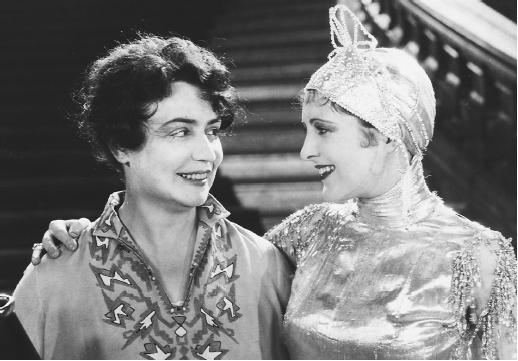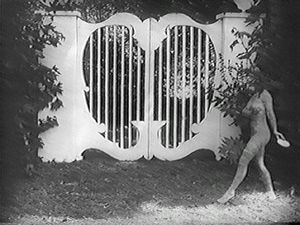
Suspense (1913)
This thriller about a wife at risk from a vagabond is quite effective in telling the story in just ten minutes. More impressive is the technical display with the use of split-screen and what has to be one of the earliest car chase scenes in cinema. It is such a well shot scene that it is exciting even to modern eyes that have seen hundreds of car chases in movies.
How Men Propose (1913)
Like many films from early cinema, this is held back by its incompleteness, in this case lacking its original intertitles. This likely takes out some of the effectiveness from this farce involving three men working up the courage to propose to a woman, not realizing they are all pursuing the same woman.
Hypocrites (1915)
One of the earliest films to have sparked a controversy for the inclusion of nudity, it is only fitting that the film is an allegory that at one point involves the public condemning a man for sculpting a naked woman, Truth. By today’s standards, there is a quaint, very artistic aspect to the depiction of Truth. The lower quality of the visuals paired with the effects make her seem more living statue than human. All of this serves the purpose of richly discussing hypocrisy among many religious practitioners.
Where Are My Children? (1916)
At a time when even contraception has again become the topic of political discussion, this film from before contraception was legal feels amazingly relevant. Seeming to take out a pro-contraception but anti-abortion position, it presents a hauntingly emotional portrait of the misery that comes with a lack of family planning, especially among the poor, contrasting that with how the wealthy are often able to work around society’s prohibitions. It is a truly great film.
Too Wise Wives (1921)
This feature is a complex commentary on the role of a wife. It looks at what society says a wife should be but compares the effect of two wives on their marriages, one who is dutiful according to society and one who is more willful but arguably is attentive to what her husband actually wants rather than what society says he wants. There’s also an economic tint to the story. There are some things that cause concern along gender lines viewed from the 21st Century, but it is probably unfair to expect something 90 years old to be perfectly progressive by modern standards.
The Blot (1921)
Picking up on the economic strain in the previous two films more directly, The Blot contrasts characters of noble profession (professor, reverend) who struggle while those of less worthy profession (making fashionable shoes that damage women’s feet) prosper. It also has a very relevant look the importance of economic security as the main family, which is poor but makes do, is thrown into desperation when one member takes ill and cannot work for a spell. Like many of Weber’s films, it is amazing how socially relevant this work remains.
-Erik Bondurant





